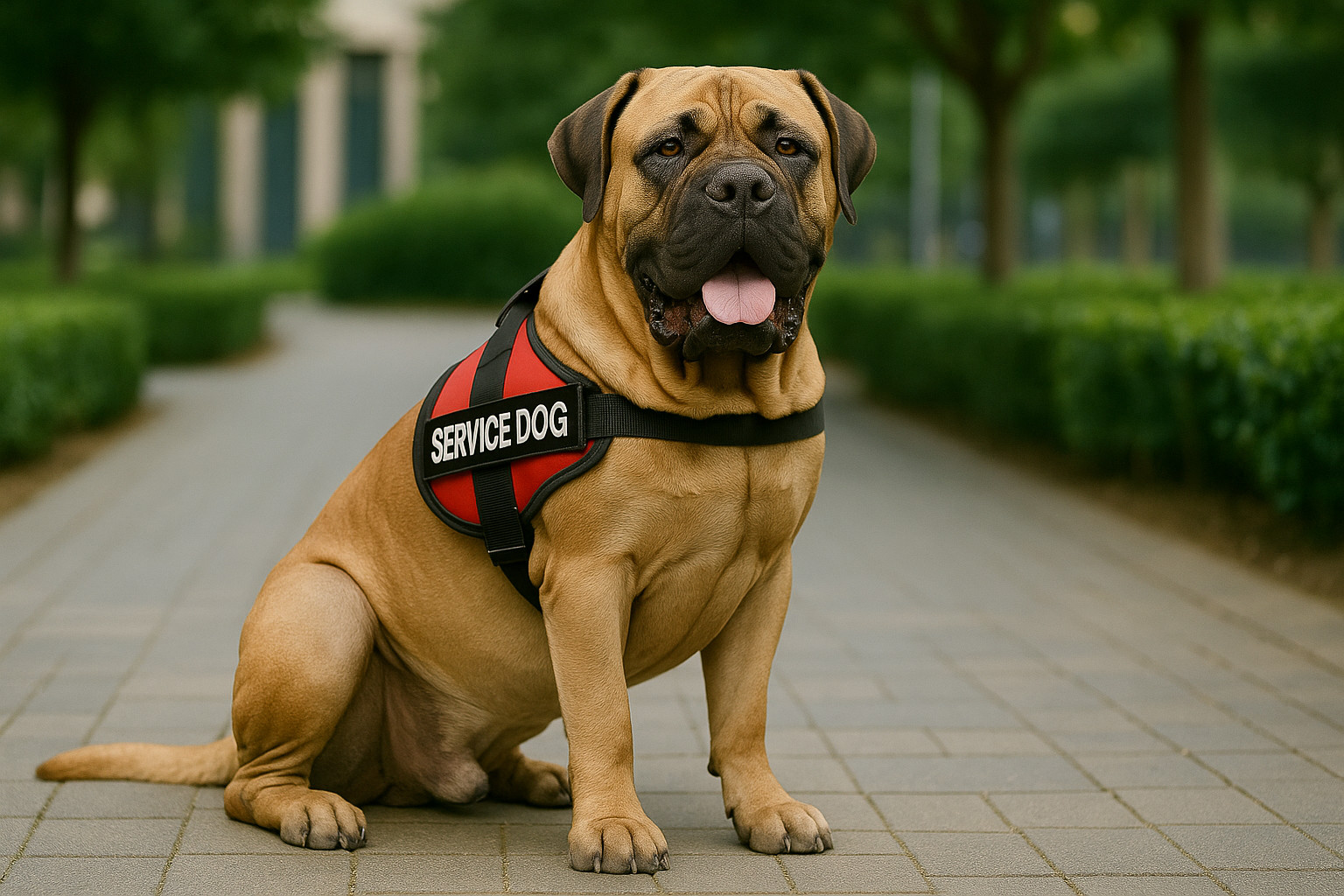Mastiff as a Service Dog

The role of a service dog is a demanding and highly specialized one, requiring specific traits and characteristics to perform effectively. The Mastiff, with its imposing presence and gentle disposition, presents a unique case in the realm of service dogs. This article explores the various aspects of the Mastiff breed, particularly in reference to its capacity and suitability for service work. By understanding the Mastiff's physical and temperamental qualities, types of service work suitable for the breed, health considerations, and training requisites, one can better appreciate the unique contribution this breed can make in the service dog world.
Mastiff Overview
The Mastiff, often referred to as the English Mastiff, is one of the largest and most ancient breeds known. They are part of the "Molossers" group, a category of large, solidly built dog breeds. Historically, Mastiffs played several roles from guard and war dogs to companions. Their sheer size and loyal nature make them both impressive and formidable, yet they possess a surprisingly gentle demeanor that can be suited for particular types of service work.
Physical Characteristics
Mastiffs are known for their imposing physical stature. Males typically weigh between 160–230 pounds, with females being slightly smaller, and stand between 27 to 30 inches tall at the shoulder. Their coat is short and lies flat against the body, and while there are various colorings, the most common are fawn, apricot, and brindle.
- Size and Strength: The sheer size and power of the Mastiff breed make them particularly suitable for roles requiring strength, such as mobility assistance. They are capable of bearing weight, which can be vital for individuals who require help with physical stability or moving from one location to another.
- Endurance and Energy Levels: Despite their size, Mastiffs are considered low to moderate in energy, which is beneficial in roles that require patience and long durations of remaining calm and stationary, such as therapy work or being a consistent presence for individuals with anxiety.
Temperament and Attitude
Mastiffs are renowned for their gentle and protective nature. Their disposition is marked by loyalty, calmness, and a regal demeanor that makes them stand out in a crowd. This temperament is a crucial factor when considering a breed for service work.
- Gentleness and Loyalty: Known for their loyalty and affection towards their family, Mastiffs can form deep bonds, which is essential for any service dog. Their gentle nature allows them to work well with children and vulnerable individuals.
- Calm and Observant: In public or stressful environments, a Mastiff's calm and observant nature is an asset. They are generally not easily spooked or anxious and have a natural inclination to assess their surroundings carefully before reacting.
- Protective Instinct: While their protective nature can be a benefit, it may also require careful training to ensure that the Mastiff responds appropriately to new people and situations, particularly in public spaces.
Types of Service Work
Though not the most traditional choice, Mastiffs can excel in certain service dog roles that capitalize on their unique attributes.
- Mobility Assistance: Mastiffs are well-suited to support individuals with mobility challenges due to their strength and size. They can serve as a physical anchor for those needing to lean on them to walk or stand and can perform tasks such as opening doors or retrieving items.
- Emotional Support and Therapy: Their calm demeanor makes Mastiffs excellent candidates for roles as emotional support animals or therapy dogs, particularly for individuals dealing with anxiety, PTSD, or other emotional difficulties. Their presence can be profoundly soothing.
- Psychiatric Assistance: Some Mastiffs may be trained to assist individuals with psychiatric disorders by performing tasks that divert or calm their handlers, such as tactile stimulation during a panic attack.
Health Considerations
Mastiffs, like many large breeds, have several health considerations that can impact their role as service dogs.
- Lifespan and Joint Issues: Mastiffs have a relatively short lifespan of 6-10 years. They also have a predisposition to hip dysplasia and other joint problems, which can be problematic for dogs intended to perform physical service roles.
- Bloat and Other Medical Conditions: Being a deep-chested breed, Mastiffs are prone to gastric torsion, known as bloat, which is a life-threatening condition. Regular health check-ups and preventive care are essential to mitigate these risks.
- Vision and Hearing: Regular screenings for vision and hearing are advisable, as impairments in these areas can limit a Mastiff's functionality as a service dog.
Training and Suitability
Training a Mastiff as a service dog comes with its own set of challenges and opportunities. Their temperament and intelligence must be factored into any training regimen.
- Trainability and Intelligence: Mastiffs are intelligent but can be stubborn, which requires a consistent, patient approach to training. Positive reinforcement is particularly effective.
- Socialization Needs: Early socialization is crucial to ensure that a Mastiff can handle a variety of situations and environments. Exposure to different people, animals, and settings helps them become more adaptable and reliable service animals.
- Training Challenges: Due to their size and strength, controlling a Mastiff can be challenging if not properly trained. Handlers need to establish themselves early on as leaders in a gentle yet firm manner.
Summary of Mastiff
In summary, Mastiffs can serve as capable and effective service dogs, particularly in roles leveraging their size, strength, and calming presence. However, their suitability depends significantly on the specific service needs and the individual's ability to manage and maintain the dog's health and training.
- Strengths:
- Mobility assistance due to strong build and size.
- Calming presence suitable for emotional support and therapy.
- Weaknesses:
- Short lifespan and predisposition to health issues.
- Requires consistent training and socialization.
- Ideal Service Roles:
- Mobility assistance for balance and support.
- Emotional support therapy for anxiety, PTSD.
- Psychiatric service assistance.
With careful consideration and appropriate training, Mastiffs can be formidable partners, providing both physical and emotional support to those in need.











